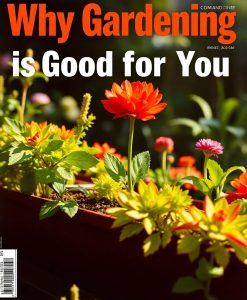As a bioethicist who has studied human wellness across different cultural contexts, I’ve long been fascinated by activities that simultaneously support physical and mental health. Gardening represents one of those rare practices that connects us deeply to natural rhythms while offering profound physiological benefits.
Growing up in Alberta, where seasonal changes dramatically shape our relationship with the landscape, I learned early that gardening is more than a hobby—it’s a form of personal resilience. The careful attention required to nurture seedlings mirrors the care we must extend to our own well-being. Scientific research increasingly validates what indigenous cultures have known for generations: interaction with soil and plants can fundamentally transform our health.
When we engage with a garden, we’re doing far more than growing food or flowers. We’re participating in a holistic wellness practice that reduces stress, improves cognitive function, and creates meaningful connections with the living world around us. For anyone seeking a gentle yet powerful approach to self-care, gardening offers an accessible pathway to enhanced mental and physical vitality.
Discovering the Quiet Power of Gardening for Your Well-Being
Imagine the sensation of earth beneath your fingertips, the coolness of soil as you dig gently into the ground. There’s a subtle rhythm to working in the garden—feeling the texture of leaves, hearing the soft rustle of plants, noticing the gentle ache in your back after a day of tending to your plants. That connection to the natural world isn’t just pleasant—it’s a gateway to better health for your mind and body.
As you nurture your garden, you might notice a calming effect washing over you, a moment of pause from the busy pace of daily life. It turns out, this sensory experience is backed by science: engaging with soil and plants can boost mood, reduce stress, and contribute to a longer, healthier life.
Many of us find ourselves drawn to gardening as a simple, accessible way to improve our mental and physical health. The act of planting, watering, and harvesting connects us to nature in a deeply primal way. But beyond the satisfaction of seeing seedlings grow, gardening offers tangible health benefits that can quietly transform how we feel day-to-day.
You may have noticed how your worries seem to fade when you’re out in the garden, hands deep in soil. Science shows that exposure to soil bacteria during gardening can support mental well-being, helping to lower stress and lift mood. The gentle physical activity involved—bending, digging, watering—also encourages movement that benefits your body, helping to keep you active and resilient.
Gardening is not just about the produce you harvest; it’s about the act of caring for living things, which can foster a sense of purpose and fulfillment. This daily connection with nature may be a key ingredient in a longer, healthier life. As you watch your plants grow, your body and mind are subtly rewiring—reducing feelings of anxiety and boosting your overall happiness.
For those seeking a natural way to support mental health, gardening is a gentle yet powerful tool. It offers a pause, a moment of mindfulness, and a chance to reconnect with the earth—something many of us need more of in our modern lives. Whether you have a sprawling backyard or a small balcony, even a few pots of herbs can provide these benefits.
If you’re wondering how to incorporate more gardening into your life, start small. A few minutes tending to your plants each day can create a ripple effect—improving mood, lowering stress, and nurturing your physical health over time. Remember, the act of caring for something living is a profound way to care for yourself.
So next weekend, when you feel the pull to step outside, consider digging into the soil. Not only will you enjoy fresh vegetables and flowers, but you’ll also be planting seeds for a longer, more vibrant life—one rooted in the simple joy of gardening.
Learn More: Why Gardening is Good for You
Abstract: If you spend your weekends toiling in the soil, you’re doing your mind and body good! In addition to reaping the benefits of eating fresh fruits and vegetables, research says that gardening supports a longer, healthier life by boosting mood, reducing stress, and lowering…
Link: Read Full Article (External Site)




